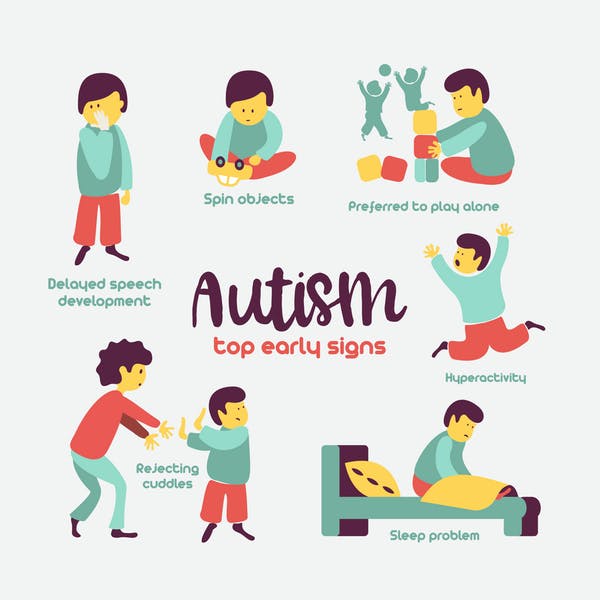Childhood obesity is a nationwide problem, and youth with autism spectrum disorders (ASDs) have an even harder time attaining or maintaining healthy weights. Twenty-four percent of children in the general population are considered obese, with a body mass index above the 95th percentile, while 31 percent of children with autism are obese. Children with autism (and Down syndrome) are two to three times as likely to be obese or overweight than typically developing children and more likely to be overweight than children with other disabilities. A trio of factors makes it particularly difficult for children with ASDs to have a healthy body stature.
3 ASD weight pitfalls
- Healthy weight management occurs when there is an energy balance of what a child eats and how much energy he expends. Children with ASDs tend to have food preferences and restricted diets that may not be balanced nutritionally. Also, kids with autism often prefer to eat high-fat, carb-filled, energy-dense food like pizza, hot dogs, chicken nuggets and crunchy or salty snacks.
- Physical activity is challenging for many children with ASDs. They may have motor limitations, weakness, low tone or feel uncoordinated, which makes it hard to keep up with typically developing peers. They may also have social, behavioral or sensory needs that put up barriers for them to participate in youth leagues that emphasize competitive sports; dynamic games may seem too complex, or winning and losing may pose behavioral challenges. It all contributes to a general preference of sedentary activities that rely on technology and screen time over active hobbies.
- Many children with ASDs are prescribed drugs that significantly affect their weight, some of which can cause rapid weight gain that is hard to lose even after the child has stopped taking the medication.
3-step parent plan
- Diet changes are especially challenging, since kids with ASDs tend to have food preferences and sensory issues that can make the introduction of new, healthier foods frustratingly difficult. Some nutritional counselors specialize in helping children with ASDs broaden their tolerance of foods and provide parents with strategies for soliciting healthier options. Go to MetroKids.com/asdweight for links.
- Caregivers often wish they could reduce the amount of sedentary screen time their kids (with and without ASDs) experience but have trouble affecting a change. Researchers have found that limiting technology use is most successful when all family members “unplug” together or parental controls are implemented. Similarly, kids with autism tend to become more active when they exercise alongside people with whom they are comfortable, people who understand their sensory or behavioral needs. Physical activity in schools or community settings are good options.
- Though medications may be necessary to assist with many of the symptoms of autism, parents should ask their kids’ doctors if there are effective options that may have less of an impact on weight.
Childhood obesity among kids with autism will continue to be a major health concern. But consistent participation from the child’s team of parents, physicians and school personnel can instill good habits in the lifelong process of enjoying improved health.
Next page: Where kids with ASDs can get active in the area
Get Active with ASDs in the Area
Several local organizations specialize in helping children with ASDs enjoy physical activities.
Special Olympics
Nearly every county in Delaware, New Jersey and Pennsylvania has an office of this national organization, which gets kids and adults of all abilities competing in sporting events and physical competitions.
Challenger Leagues
This division of Little League lets boys and girls 4 to 18 with physical and mental disabilities play adaptive team baseball. Click and enter your zip code to find a nearby coach.
Swimming & fitness
YMCAs throughout the region offer a variety of ability programs. Advanced Director Cait Waxler, based in Ambler, PA, connects families throughout the area to their local Y programs. Contact her at 215-628-9950, ext. 1537 or email [email protected].
Karate for special needs
Action Karate, with seven PA locations, and Chang’s School of Martial Arts – Karate Adapted for Autism (KAFA) in King of Prussia specialize in adapted martial arts for people with ASDs.
Bicycle riding training
iCan Shine, formerly known as “Lose the Wheels,” is a Paoli-based organization that holds bike-riding training for people with disabilities. Sign up early at Icanshine.org/find-a-program; classes fill up very quickly.
Accessible walking and biking trails
French Creek State Park: 843 Park Rd., Elverson, PA
Hibernia County Park: Park Rd. Coatesville, PA
Marsh Creek State Park: 675 Park Rd., Downingtown, PA
Perkiomen Trail, Montgomery County End Points: Hill Rd. at Lumber St. (Green Ln.) to Station Ave., Oaks
Ridley Creek State Park: 1023 Sycamore Mills Rd. Media
Strubel Trail: Downingtown, PA; trailhead at Norwood Rd. ends near March Creek and connects to the Uwchlan Trail.
Click here for plenty more trail options in PA, NJ and DE.
The arts for social skills
Acting Antics in Malvern, PA, specializes in getting kids with special needs involved with theater as an outlet to work on their social skills. Likewise, Tempo Music Therapy Services in West Chester, PA, addresses sensory and motor needs through music.
Dr. Johanna Spangenberg, PT, DPT, has been working as a physical therapist at The Vanguard School, a program of Valley Forge Educational Services, since 2008. She has a special interest in autism and weight related issues. Johanna enjoys working with children with physical and cognitive challenges. She graduated from the University of Connecticut with a degree in physical therapy degree. She also holds a clinical doctorate in physical therapy with a pediatric specialty from Rocky Mountain University of the Health Professions.






